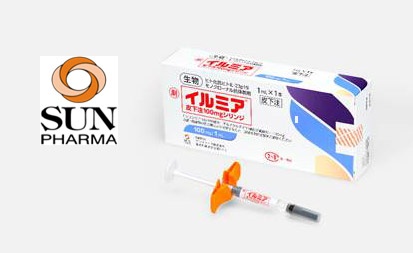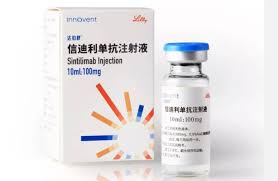Sun Pharma Announces the Launch of ILUMYA® (tildrakizumab) for Treatment of Plaque Psoriasis in Japan
Sun Pharmaceutical Industries Limited (Reuters: SUN.BO, Bloomberg: SUNP IN, NSE:SUNPHARMA, BSE: 524715, “Sun Pharma” and includes its subsidiaries and/or associate companies) today announced that its wholly-owned Japanese subsidiary has launched ILUMYA® Subcutaneous Injection 100 mg Syringe (Nonproprietary name: tildrakizumab (genetical

Sun Pharmaceutical Industries Limited (Reuters: SUN.BO, Bloomberg: SUNP IN, NSE:SUNPHARMA, BSE: 524715, “Sun Pharma” and includes its subsidiaries and/or associate companies) today announced that its wholly-owned Japanese subsidiary has launched ILUMYA® Subcutaneous Injection 100 mg Syringe (Nonproprietary name: tildrakizumab (genetical recombination), “ILUMYA”) in Japan for the treatment of plaque psoriasis in adult patients who have an inadequate response to conventional therapies.
ILUMYA is a humanized lgG1/k monoclonal antibody designed to selectively bind to the p19 subunit of IL-23 and inhibit its interaction with the IL-23 receptor, leading to inhibition of the release of pro-inflammatory cytokines and chemokines.
Junichi Nakamichi, Country Head, Sun Pharma Japan, said, “ILUMYA is Sun Pharma’s first innovative drug to be launched in the Japanese market. We are pleased to introduce a new, safe and effective treatment option for plaque psoriasis to doctors and patients in our country. This is an important milestone for Sun Pharma as we expand our product portfolio in Japan.”
ILUMYA® product outline
| Product name | ILUMYA subcutaneous 100mg syringe |
| Nonproprietary name | Tildrakizumab (genetical recombination) |
| Dosage form | Injection (prefilled syringe) |
| Effect / efficiency | Plaque psoriasis, which does not respond adequately to conventional therapies |
| Dosage and administration | Normal administration: 100mg of subcutaneous administration to adults as tildrakizumab (genetical recombination) in the first dose, followed by doses 4 weeks later and every 12 weeks thereafter. |
| National Health Insurance listed price | ILUMYA subcutaneous injection: 100mg syringe 1 cylinder: 487,413 yen |
| Marketing authorization date | June 29, 2020 |
| Date of listing in the National Health Insurance drug list | August 26, 2020 |
| Launch date | September 23, 2020 |
| Manufacturing Approval holder | Sun Pharma Japan Limited |
Product photo
IMPORTANT SAFETY INFORMATION
ILUMYA is contraindicated in patients with a previous serious hypersensitivity reaction to ILUMYA or to any other excipients.
Cases of angioedema and urticaria occurred in ILUMYA -treated subjects in clinical trial. If a serious hypersensitivity reaction occurs, discontinue ILUMYA immediately and initiate appropriate therapy.
ILUMYA may increase the risk of infection. Treatment with ILUMYA should not be initiated in patients with a clinically important active infection until the infection resolves or is adequately treated. Consider the risks and benefits of treatment prior to prescribing ILUMYA in patients with a chronic infection or a history of recurrent infection. Instruct patients receiving ILUMYA to seek medical help if signs or symptoms of clinically important chronic or acute infection occur. If a patient develops a clinically important or serious infection, or is not responding to standard therapy, closely monitor and discontinue ILUMYA until the infection resolves.
Evaluate patients for TB infection prior to initiating treatment with ILUMYA. Do not administer ILUMYA to patients with active TB infection. Initiate treatment of latent TB prior to administering ILUMYA. Consider anti-TB therapy prior to initiation of ILUMYA in patients with a past history of latent or active TB in whom an adequate course of treatment cannot be confirmed. Patients receiving ILUMYA should be monitored closely for signs and symptoms of active TB during and after ILUMYA treatment.
Most common (≥1%) adverse reactions associated with ILUMYA include upper respiratory infections, injection site reactions, and diarrhea. Adverse reactions that occurred at rates less than 1% but greater than 0.1% in the ILUMYA group and at a higher rate than in the placebo group included dizziness and pain in extremity.






